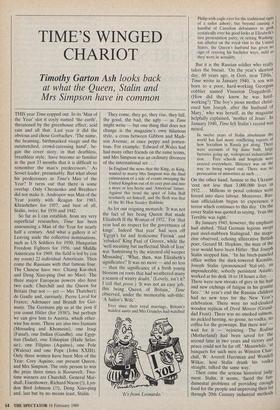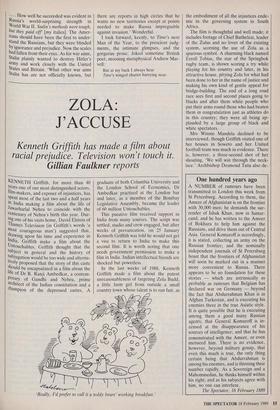TIME'S WINGED CHARIOT
Timothy Garton Ash looks back
at what the Queen, Stalin and Mrs Simpson have in common
THIS year Time copped out. In its 'Man of the Year' slot it coyly named 'the earth', threatened by the greenhouse effect, acid rain and all that. Last year it did the obvious and chose Gorbachev. 'The name, the beaming, birthmarked visage and the outstretched, crowd-caressing hand', be- gan the cover story, in that deathless, breathless style, 'have become so familiar in the past 33 months that it is difficult to remember the man's predecessors.' As Soviet leader, presumably. But what about his predecessors as Time's Man of the Year? It turns out that there is some overlap. Only Chernenko and Brezhnev did not make it. Andropov was Man of the Year jointly with Reagan for 1983, Khrushchev for 1957, and best of all, Stalin, twice, for 1939 and 1942.
So far as I can establish, from my very superficial researches, Time has been announcing a Man of the Year for nearly half a century. And what a gallery it is! Leaving aside the collective nominations, such as US Soldiers for 1950, Hungarian Freedom Fighters for 1956, and Middle Americans for 1969, the field is led by (on my count) 22 individual Americans. Then come the Russians with that famous four. The Chinese have two: Chiang Kai-shek and Deng Xiao-ping (but no Mao). The three major European powers also have two each: Churchill and the Queen for Britain (but not — yet — Mrs Thatcher); de Gaulle and, curiously, Pierre Laval for France; Adenauer and Brandt for Ger- many. The Germans pip us at the post if you count Hitler (for 1938!), but perhaps we can give him to Austria, which other- wise has none. There are also two Iranians (Mossadeq and Khomeini), one Iraqi (Faisal), one Indian (Gandhi), one Egyp- tian (Sadat), one Ethiopian (Haile Selas- sie), one Filipino (Aquino), one Pole (Walesa) and one Pope (John XXIII). Only three women have been Men of the Year: Cory Aquino, our present Queen, and Mrs Simpson. The only person to win the prize three times is Roosevelt. Two- time winners are Churchill, General Mar- shall, Eisenhower, Richard Nixon (!), Lyn- don Bird Johnson (!!), Deng Xiao-ping and, last but by no means least, Stalin. They come, they go, they rise, they fall, the good, the bad, the ugly — as Time might write — but one thing that does not change is the magazine's own hilarious style, a cross between Gibbon and Madi- son Avenue, at once peppy and porten- tous. For example: 'Edward of ,Wales had had many other friends on the same terms, and Mrs Simpson was an ordinary divorcee of the international set ...'
In England the news that the King, as King, wanted to marry Mrs Simpson was the final culmination of a tide of events sweeping the United Kingdom out of its cozy past and into a more or less hectic and 'American' future. Against this trend' the spirit of John Bull resolutely set himself, and the flesh was that of the Rt Hon Stanley Baldwin.
As for our reigning monarch: 'It was not the fact of her being Queen that made Elizabeth II the Woman of 1952.' For 'that year had no respect for the governance of kings'. Indeed 'that year' had seen off 'Egypt's fat and frolicsome Farouk'. and 'rebuked' King Paul of Greece, while the 'well meaning but ineffectual Shah of Iran' was 'hamstrung by the wizened old weeper Mossadeq'. 'What, then, was Elizabeth's significance? It was no more — and no less — than the significance of a fresh young blossom on roots that had weathered many a season of wintry doubt.' (Lovely, isn't it? I call that prose.) 'It was not an easy job, this being Queen of Britain,' Time observed, under the memorable sub-title: 'A Sailor's Wife'.
Ever since their royal marriage, Britain's maiden aunts and Mrs Grundys had watched
Philip with eagle eyes for the traditional signs of a sailor ashore; but beyond causing a handful of Canadian debutantes to gush ecstatically over his good looks at Elizabeth's first presentation party, or setting Washing- ton aflutter on the royal visit to the United States, the Queen's husband has given no sign of reviving his bachelor ways, mild as they were in actuality.
But it is the Russian soldier who really takes the biscuit. 'On the year's shortest day, 60 years ago, in Gori, near Tiblis,' Time wrote in January 1940, 'a son was born to a poor, hard-working. Georgian cobbler named Vissarion Djugashvili.' (I-low did they know he was hard- working?) 'The boy's pious mother christ- ened him Joseph, after the husband of Mary,' who was 'herself, as the magazine helpfully explained, 'mother of Jesus'. In January 1940, Time felt Stalin's record was mixed.
In twelve years of Stalin absolutism the world has had many conflicting reports of how Socialism in Russia got along. There were accounts of big dams built, large factories going up, widespread industrialisa- tion.... Free schools and hospitals were
erected everywhere. Illiteracy was on the way to being wiped out. There was no persecution of minorities as such....
On the other hand, famine in the Ukraine 'cost not less than 3,000,000 lives in 1932.... Millions in penal colonies were forced into slave labour. Moreover, Rus- sian officialdom began to experience a terror which continues to this day.' On the cover Stalin was quoted as saying, 'Ivan the Terrible was right.'
By January 1943, however, the emphasis had shifted. Had German legions swept past steel-stubborn Stalingrad,' the maga- zine observed, echoing alliterative British poet, Gerard M. Hopkins, the man of the year would have been Hitler. 'But Joseph Stalin stopped him.' In his birch-paneled office within the dark-towered Kremlin, Joseph Stalin (pronounced Stal-yn), an imponderable, soberly persistent Asiatic, worked at his desk 16 to 18 hours a day. • • There were new streaks of grey in his hair and new etchings of fatigue in his granite face.' At year's end the Russian children had no new toys for the New Year's celebration. There were no red-cloaked wooden replicas of Dyed Moross (Grand- dad Frost). There was no smoked salmon, no pickled herring, no goose, no vodka, no coffee for the grownups. But there was' wait for it — 'rejoicing. • The Rodina (Motherland) had been saved for the second time in two years and victory and peace could not be far off.' Meanwhile, at banquets for such men as Winston Chur- chill, W. Averell Harriman and Wendell Wilkie, host Stalin drank his vodka straight, talked the same way.' Then came the serious historical judg- ment. Stalin, it seems, 'faced the fun- damental problems of providing enough food for the people and improving their lot through 20th Century industrial methods
• • . How well he succeeded was evident in Russia's world-surprising strength in World War H. Stalin's methods were tough, but they paid off [my italics]. The Amer- icans should have been the first to under- stand the Russians, but they were blinded by ignorance and prejudice. Now the scales had fallen from their eyes. As for war aims, Stalin plainly wanted to destroy Hitler's army and work closely with the United States and Britain. 'What other war aims Stalin has are not officially known, but there are reports in high circles that he wants no new territories except at points needed to make Russia impregnable against invasion.' Wonderful.
I look forward, keenly, to Time's next Man of the Year, to the prescient judg- ments, the intimate glimpses, and the gorgeous prose. Joked sometime British poet, mooning metaphysical Andrew Mar- vell:
But at my back 1 always hear Time's winged chariot hurrying near.



















































 Previous page
Previous page